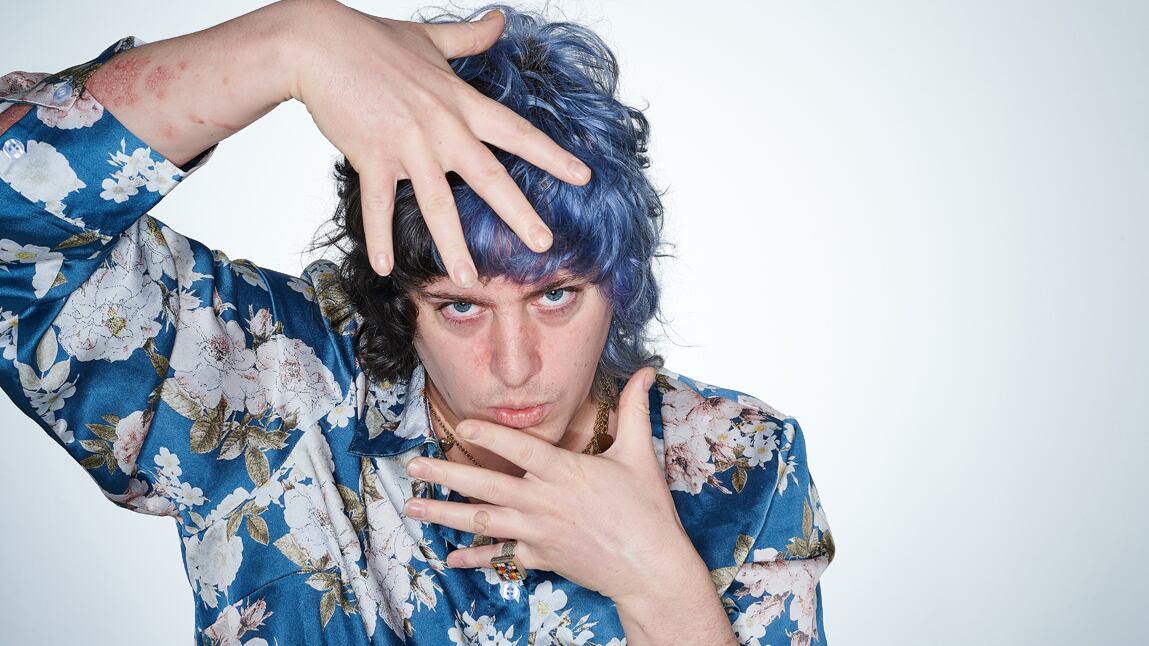In 2018, Riley McCarthy decided to use his stage time at Helium Comedy Club to joke about Nazi hierarchy. Namely, skinheads being required to attack an immigrant, Jew, person of color or queer person in order to “earn” a pair of red shoelaces indicating their rank.
Hang on. Stay with him.
“These bigoted homophobic assholes are showing their pride in their lifestyle with a piece of colorful flair,” McCarthy, a wide-eyed, moppy-haired whirlwind, said in his set, charging across the stage. “I’m sorry—that’s gay as shit, my dude! Are you honestly going to try to appropriate pizazz from the queer community?” (McCarthy identifies as bisexual.)
After watching the performance, it was surprising to hear McCarthy describe his own taste in comedy as “optimistic” in a March 10 interview with WW. He explained that he doesn’t tend to find dark humor all that funny.
“I find whimsical stuff makes me laugh the most. Silly stuff,” he says.
So what’s with the Nazi jokes?
“There’s a difference,” he says, “between having a dark setup and a dark punchline.”
Even when McCarthy is tackling bigotry, politics or his own mental health, darkness is never really integral to the point of the joke. Instead, it’s almost incidental—casually intersecting with the punchline, which is usually madcap, personal and, yes, even whimsical.
“I think people find that really rewarding as a viewer of a joke—setting up that kind of tension of something intense or evocative and seeing it kind of made human,” he says.
Like the time he almost got into a fight with a red-laced Nazi at Plaid Pantry (“I should probably mention that this guy was about 5 foot 1…he was one of those mini-bigots. Biglets, as I like to call them”). Or the time he conned a Starbucks barista into assuming he was a doctor at a nearby psychiatric hospital, not a patient (“I had to lie. I had to! It was the quickest I’d ever gotten a promotion!”).
Because even when he leans into a bit of darkness, McCarthy doesn’t do snark. It’s just not his style.
The process of developing his comedic voice began in childhood, when his dad would bring home comedy albums. McCarthy’s first obsession was Steve Martin. He started listening to Mike Birbiglia, Emo Philips and Mitch Hedberg as he entered his teen years.
They have drastically different formats—Martin delivered off-kilter non sequiturs, Birbiglia was a classic storyteller, Philips would fidget and rant, and Hedberg thrived on deadpan one-liners—but at the core of each act was an utter lack of cynicism.
Like his idols, McCarthy is sincere in his silliness. His borderline-manic performing style is most comparable to Philips. McCarthy tried to write one-liners at the start of his career, à la Hedberg, but found he just didn’t have the knack for it.
“I just can’t fucking do that form,” he says. “It’s like math. You have to be really smart [with] your syntax.”
When it comes to the content of his jokes, Birbiglia’s influence is most apparent. McCarthy also likes to tell a story, taking the audience along on a singular drawn-out adventure over the course of a 10-minute set.
“The hard part in figuring out and developing a storytelling joke is kind of figuring out what the thesis is. I think there has to be something relatable at the base of a storytelling joke for it to work, and I don’t always know what that is when I’m writing it,” he says, adding that he usually doesn’t figure out what’s funny about a punchline until he finally performs it live.
In that way, his writing process is a continuous collaboration between himself and the audience: “Write a draft, perform it, see what’s hitting, throw everything out that I just wrote, and rewrite it around what got a laugh.”
It worked great up until almost exactly two years ago. For McCarthy, who relies on a constant feedback loop, the pandemic proved catastrophic. Trying to do comedy over Zoom was a nightmare—he found he could barely hold a natural one-on-one conversation, let alone read the room during a set.
“It was very disheartening in quarantine,” he says. “It was kind of a maddening process. I’d be writing something and developing it, but there’s only so much I can do before the idea has to be walked out the door and shown.”
Despite the intermission. McCarthy worked on other creative projects, like Riley Paints His Friends, a Twitch series that depicts him interviewing his guests as he paints their portraits.
And he did eventually return to in-person shows. In 2021, he was named runner-up at Portland’s Funniest Person, a contest hosted by Helium Comedy Club. In the meantime, he says, he’s excited to debut new material onstage for Funniest Five.
“I’ve always tended toward earnestness,” he says. “But I think the pandemic, and the trauma of that, really formed that into kind of a core value for me. It sounds cheesy, but I feel like compassion has come into the foreground of my comedic voice.”
